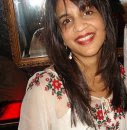Thursday, May 7, 2009
Michael Pollan, you truly are a rock star!
Saturday, February 21, 2009
Will Slumdog win?
In the last 2 months, it has been hard to read any entertainment news without reading “Slumdog Millionaire”. The Oscar buzz, the protests in
I saw the movie the weekend it premiered in the
Very few people, including Indians, had the same reaction. Infact, that is usually a sign of a good movie - it’s engrossing enough that the audience doesnt notice things like it was shot in black and white, or it had subtitles, or characters were switching languages, etc. I am happy Slumdog is getting credit for being such a movie. I am sure if it were based in another country, I too wouldn’t notice or care for the authenticity of accents and appearances of the main characters.
So, what do I think of the protests in
Regardless of how I feel about the movie, I will be rooting for Slumdog at the Oscars tomorrow. Anil Kapoor and Irfan Khan are one of the finest indian actors and deserve it. And for A.R Rahman, who is my favourite Indian music composer. If not for anything else, I will be rooting for Slumdog for the little kids in the movie- that was my favourite part of the movie. I sincerely hope the success of this movie does indeed transform those kids' lives. That will touch me in a way no other Oscar winning movie has.
Sunday, November 2, 2008
Campaign 2.0 - How the Obama campaign raised the bar
Sunday, October 26, 2008
The case for HOPE
Wednesday, August 20, 2008
Jet Airways - the epitome of Customer Service
"Vegetarian or Non-Vegetarian?" I answered vegetarian, expecting my tray of airline food. But there was a follow up question - "South or North Indian?". After a brief thought I asked for south indian. I was handed a tray with a white cloth napkin, tied with nice blue rope, that held steel cutlery! Oh, did I mention I was flying coach? I was on a domestic route on Jet Airways from Mumbai to Delhi, a 2 hour flight!
Its not just in-flight meal and use of real cloth napkins and steel cutlery, even in coach, that sets this airline apart. Jet Airways has impressed me over and over again in the last 2 years with their customer service all through their value chain - right from the call center operator that takes your booking, to the check-in agents at the airport to in-flight attendants. Two years ago, I was flew into Mumbai International from SFO and had to make a connection to Hyderabad from Mumbai's domestic. The incoming flight was a bit late and by the time I took the shuttle to the Domestic airport, I had less than 30 min before my connecting flight took-off. I ran in with my 2 big bags and found a Jet Airways agent to tell him I was an international passenger and on the Hyd flight. He immediately took my bags and asked his peer to get it screened by security ( a process required pre-check in at indian airports), got me my boarding pass and asked me to run to the gate and promised me my bags meet me in Hyd. Sure enough, my bags landed in Hyd with me. Had it been any other airline (yes, even Singapore), I would have missed my connection.
It is not a surprise that Jet Airways profit is growing in triple digits when other airlines are struggling to even make one (they reported a profit of $7M in Q2 08). Other indian airlines too are trying to follow suit, but I found that the agents are not as well informed and cant seem to take charge and make decisions when presented with a new query or situation. There is something to be said about the quality of people Jet hires.
As I say on my Facebook status today, I've become a fan of Jet Airways. They have raised the bar for the airline industry and no other airline even comes close.



